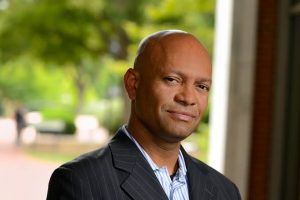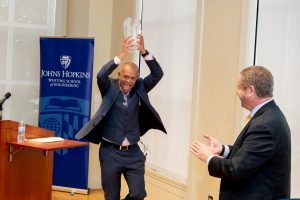Johns Hopkins UniversityEst. 1876
America’s First Research University

For Ralph Etienne-Cummings, the new Julian S. Smith Professor in the Whiting School’s Department of Electrical and Computer Engineering, communications technologies are “a big deal.” It’s fitting, as electrical engineer Julian Sinclair Smith, Engr ’52, ’56 (MSE) — the professorship’s namesake and a Baltimore native — formed what would eventually become Sinclair Broadcast Group.
Communications is what initially drew Etienne-Cummings to engineering, until, as he quips, he was “co-opted by the neuroscience people.”
Since shifting to the neuroscience and biomedical sides of engineering, Etienne-Cummings has spent the last three decades pioneering the research and development of mobile robotics, including prosthetics that interface with the human body to restore functionality after injury or disease. His recent work has also advanced the understanding of how to use biological signals to control robots, and he has developed an implantable device to mitigate spinal cord injuries; a wearable physiological sensor to track the health of cardiac patients after admission; ultrasonic imaging systems and actuated catheters, a new robotic catheter concept, for infertility treatment; and other technologies that morph neurophysiology and electrical and computer engineering.
In addition to creating more humanlike machines, Etienne-Cummings has spent his career focused on promoting diversity in science, technology, engineering, and mathematics (STEM) and developing future engineers. We spoke with him about his roles in the department, work in advancing STEM, and service as university leadership.
The teaching side is easy. I’m teaching a sophomore course, Intro to Integrated Circuits, so these are young folks in the field. In the class, they design a camera, like the one on your phone, from scratch on a microchip. I want to grow the pipeline and make sure that at Hopkins and beyond, there are folks in the chip design and integrated circuits area.
The research side is easy as well. I love interacting with students. I love understanding how the brain, and their brains, work and thinking about how to build better-engineered systems that are more inspired by our brains and our bodies. It keeps me going.
I have undergraduate and graduate students and post-doctoral fellows working in my lab. I occasionally host high school students too, which is an opportunity that allows us to outreach beyond our immediate environment and the university itself.
I think about it as a kind of vertical integration. It is wonderful for training the next leaders because you can see the undergraduate students start supervising the high school students, and the grad students are supervising the undergraduate and high school students. As the students get more mature, the vertical integration allows them to get to see and guide folks of different stages of their development. As a faculty member, I get to interact with all of them.
I also run a program called the Research Experience for Undergraduates (REU), which is funded by the National Science Foundation. REU brings 10 or so undergraduates from all over the country to campus every summer, and the goal is to encourage underrepresented minorities to engage in STEM. We get applicants from 200-odd minority-serving institutions and community colleges. These are some of the smartest kids that you’ll come across, and they’re working in robotics and on engineering-type questions.

There’s no question we do better in terms of developing technology, understanding the marketplace, and having a broader impact on our society when the technology is developed with folks who are diverse, by folks who are diverse, and for folks who are diverse. If you don’t have all that in mind, then you are automatically restricting the space by which your technology is going to be relevant.
Some folks may argue there is no difference in the technology that a minority candidate would develop versus a majority candidate. But I don’t think that’s true. Experience has a big impact. If your experience has taught you the need of certain things, then you will most likely spend the time thinking about how to fill that need. On top of that, especially in the biomedical fields, clinical trials are set up to include a diverse population in the tests because at the end of the day, the technology has to be relevant and has to be tested in various different use cases.
Another prong of academic life is service, and this is what I get to do in the Provost’s Office. I think of myself as being responsible for faculty, from the moment they’re hired and even beyond retirement and everything between. The other big part that I really think is super important is developing and celebrating all the great people that we have in this university. The final part is setting up the environment that will continue to keep them connected to the university once they transition into retirement.
This is what we do as academics — research, education, translation, and service.
This professorship is a high honor that I cannot adequately articulate, and I’m hoping to be able to uphold what the previous two professors who have held this position [Fred Jelinek and Hynek Hermansky], both giants in the field of speech and natural language processing, have done to live up to the name. ChatGPT, which we’re talking about so much now, would not exist if it wasn’t for those two folks. I’m coming about it in a different way, from the perspective of what can we do to build machines that will be more humanlike in the way they process information. It’s amazing that I have had the opportunity to step in their shoes.
Topics: Faculty and Staff, Fuel Discovery, Promote and Protect Health